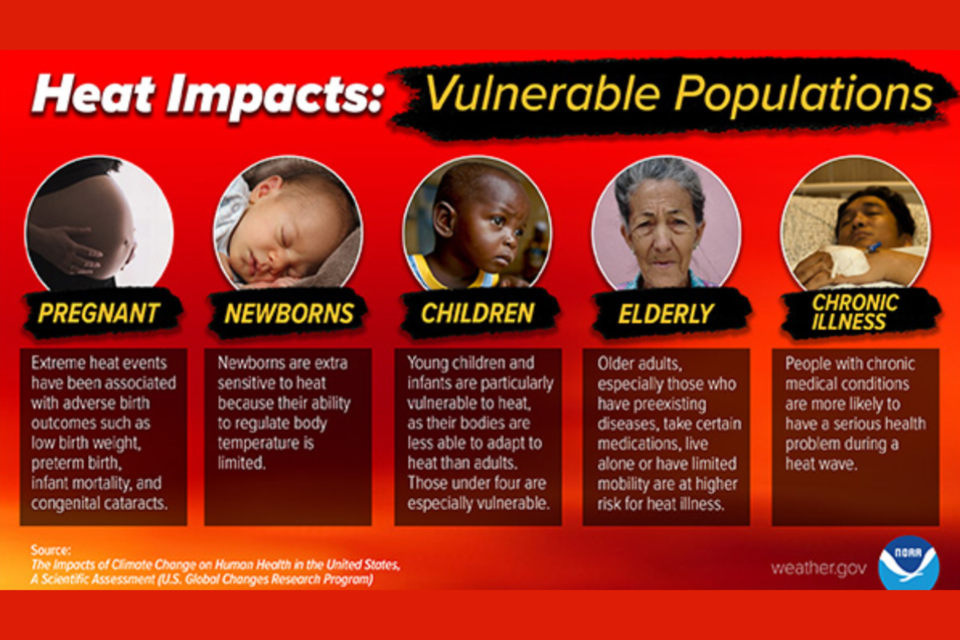The National Weather Service in Charleston has issued a Heat Advisory for Bulloch County on Thursday, July 20, 2023 from 11 AM to 6 PM. The heat index values could be as high as 112 degrees today.
HEAT ADVISORY REMAINS IN EFFECT FROM 11 AM THIS MORNING TO 6 PM EDT THIS EVENING
WHAT
Heat index values up to 112 expected.
WHERE
Portions of southeast Georgia and southeast South Carolina.
WHEN
From 11 AM this morning to 6 PM EDT this evening.
IMPACTS
Hot temperatures and high humidity may cause heat illnesses to occur.
PRECAUTIONARY/PREPAREDNESS ACTIONS
- Drink plenty of fluids
- Stay in an air-conditioned room
- Stay out of the sunshine
- Check up on relatives and neighbors
- Young children and pets should never be left unattended in vehicles under any circumstances.
- Take extra precautions if you work or spend time outside.
- When possible reschedule strenuous activities to early morning or evening.
- Know the signs and symptoms of heat exhaustion and heat stroke.
- Wear lightweight and loose fitting clothing when possible.
- To reduce risk during outdoor work, the Occupational Safety and Health Administration recommends scheduling frequent rest breaks in shaded or air conditioned environments.
- Anyone overcome by heat should be moved to a cool and shaded location.
- Heat stroke is an emergency! Call 9 1 1.
Heat Safety Tips and Resources
Heat is one of the leading weather-related killers in the United States, resulting in hundreds of fatalities each year. Heat can be very taxing on the body; check out the heat related illnesses that can occur with even a short period of exposure. Everyone can be vulnerable to heat, but some more so than others. According to The Impacts Of Climate Change On Human Health In The United States: A Scientific Assessment the following groups are particularly vulnerable to heat; check in with friends and relatives who fall in one of these populations, especially if they don’t have air conditioning.
- Young children and infants are particularly vulnerable to heat-related illness and death, as their bodies are less able to adapt to heat than are adults.
- Older adults, particularly those with pre existing diseases, take certain medications, are living alone or with limited mobility who are exposed to extreme heat can experience multiple adverse effects.
- People with chronic medical conditions are more likely to have a serious health problem during a heat wave than healthy people.
- Pregnant women are also at higher risk. Extreme heat events have been associated with adverse birth outcomes such as low birth weight, preterm birth, and infant mortality, as well as congenital cataracts.
It is NEVER safe to leave a child, disabled person or pet locked in a car, even in the winter. If you have a toddler in your household, lock your cars, even in your own driveway. Kids play in cars or wander outside and get into a car and can die in 10 minutes! A reported 33 children died in hot cars in 2022. To see the latest information for 2023, go to this link. Deaths routinely are reported as early as April and tragedies continue into December in southern states.
NWS Safety information on Children, Pets and Vehicles: Find out more about how cars can heat up quickly when left in the sun. Information and resources in both English and Spanish from the National Highway Traffic Safety Administration.
This website is designed to prepare you for excessive heat events, describe what to do during a an excessive heat wave, and inform you about the health dangers of heat. You also will find educational materials and fun games and activities to help educate children about the dangers of heat. Spanish language outreach materials are also available.
If you, or someone you know, have been a victim of excessive heat, please share your story as others have here so we can prevent others from becoming a heat victim. When you write, please note that NWS has permission to use your story and, if possible, let us know the town and state you were in and the year the event took place.
For the federal hub on heat health information, safety, and resources, check out Heat.gov.




